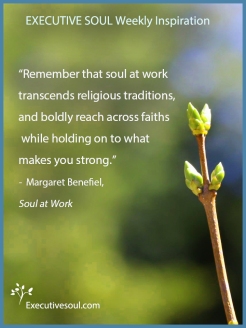What more appropriate way to honor Nelson Mandela on his 95th birthday today than to reflect on his concept of Ubuntu? “Ubuntu” a word from the Bantu language of southern Africa, roughly translated “I am because we are,” sums up Mandela’s approach to leadership, incorporating a generous spirit and concern for the well-being of one’s community.
For Nelson Mandela, Ubuntu provided the underlying framework for the healing of South Africa after apartheid ended. President Mandela’s understanding of the interconnectedness of all humanity spurred him to embrace South Africa’s rugby team (a symbol of white oppression to many blacks) and urge the country to support it in its bid for the championship. During a very tense and unsteady time in South Africa’s history, Nelson Mandela prompted both black and white Africans to rally behind a common cause at the 1995 Rugby World Cup at Ellis Park Stadium. By inspiring black Africans to accept a predominantly white African team as their own, and by convincing the white team members to learn the national anthem (previously a black protest song), Nelson Mandela united the country in the spirit of sportsmanship.
Even more importantly, Mandela’s understanding of Ubuntu motivated him to establish the Truth and Reconciliation Commission in 1995. South Africa had needed to come to terms with how it would bring to justice perpetrators of crimes under the old regime. Retributive justice was not only too costly for the financially strapped country, but would also result in winners and losers and could easily backfire. Blanket amnesty, on the other hand, would leave the victims unacknowledged, in effect victimizing them again.
By establishing the Truth and Reconciliation Commission, Nelson Mandela chose a third way, distinct from both retributive justice and blanket amnesty. By inviting perpetrators to apply for amnesty in exchange for full disclosure of their crimes, South Africa chose restorative justice. Archbishop Desmond Tutu, whom President Mandela named chair of the Truth and Reconciliation Commission, shared Mandela’s understanding of Ubuntu:
Ubuntu speaks particularly about the fact that you can’t exist as a human being in isolation. It speaks about our interconnectedness. You can’t be human all by yourself, and when you have this quality – Ubuntu – you are known for your generosity.
Generosity and forgiveness formed the backbone of the Truth and Reconciliation Commission. The Commission structured itself to facilitate forgiveness by 1) setting a fixed two-year term for its operations, thus assuring that those who desired amnesty would have ample time to apply for it and also assuring that the process would have a clear ending, 2) collecting statements from victims and perpetrators, and 3) holding public hearings in districts across the country. The Commission heard testimony from victims and perpetrators of both government forces and rebel forces, and facilitated forgiveness and restorative justice whenever possible. The result? Instead of a bloodbath, which many had feared, reconciliation and healing occurred.
Nelson Mandela built the new South Africa on Ubuntu. What can other societies learn from him? Can Ubuntu inspire societal change in other cultures?
The verdict of “not guilty” for George Zimmerman in the killing of Trayvon Martin has sparked much debate in the past week in the U. S. Can Ubuntu speak to this situation?
One of the most re-Tweeted Tweets on Twitter on Sunday, by Tom Crabtree of the Tampa Bay Buccaneers, reflects an Ubuntu mindset: “How cool would it be to live in a world where George Zimmerman offered Trayvon Martin a ride home to get him out of the rain that night.” A sense of the interconnectedness of all of life and a spirit of generosity would, indeed, have led to a very different outcome. The ubiquity of this tweet, the way it has been embraced by so many people, suggests that a good portion of society might be ready to live into this mindset. How might an Ubuntu mindset lead to a reexamination of Florida’s “stand your ground” law? How might an Ubuntu mindset lead to structures of justice that serve all people equally?
Nelson Mandela gave the gift of Ubuntu leadership to the new South Africa, and in doing so, opened Ubuntu’s possibilities to the world. Let us honor Nelson Mandela on his 95th birthday today by engaging our imaginations, our hearts, and our minds in the possibilities of Ubuntu for the challenges before us now. May we rise to the occasion and apply Ubuntu principles in our time just as creatively as Nelson Mandela did in his.
(Parts of this article are excerpted from The Soul of a Leader (Crossroad, 2008). Used with permission of the publisher.)
















